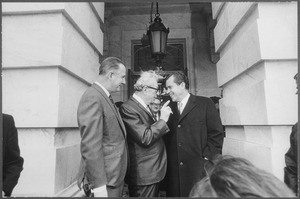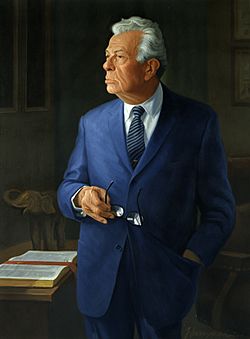Everett Dirksen facts for kids
Quick facts for kids
Everett Dirksen
|
|
|---|---|
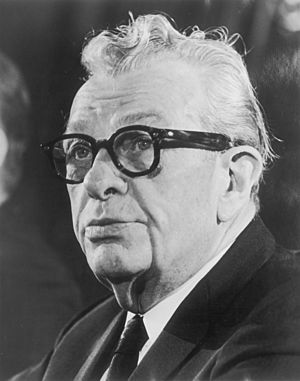
Dirksen in 1968
|
|
| Senate Minority Leader | |
| In office January 3, 1959 – September 7, 1969 |
|
| Deputy | Thomas Kuchel Hugh Scott |
| Preceded by | William F. Knowland |
| Succeeded by | Hugh Scott |
| Senate Minority Whip | |
| In office January 3, 1957 – January 3, 1959 |
|
| Leader | William F. Knowland |
| Preceded by | Leverett Saltonstall |
| Succeeded by | Thomas Kuchel |
| United States Senator from Illinois |
|
| In office January 3, 1951 – September 7, 1969 |
|
| Preceded by | Scott W. Lucas |
| Succeeded by | Ralph Tyler Smith |
| Member of the U.S. House of Representatives from Illinois's 16th district |
|
| In office March 4, 1933 – January 3, 1949 |
|
| Preceded by | William E. Hull |
| Succeeded by | Leo E. Allen |
| Personal details | |
| Born |
Everett McKinley Dirksen
January 4, 1896 Pekin, Illinois, U.S. |
| Died | September 7, 1969 (aged 73) Washington, D.C., U.S. |
| Political party | Republican |
| Spouse |
Louella Carver
(m. 1927) |
| Children | 1 |
| Education | University of Minnesota |
| Military service | |
| Allegiance | |
| Branch/service | |
| Years of service | 1918–1919 |
| Rank | |
| Battles/wars | World War I |
Everett McKinley Dirksen (born January 4, 1896 – died September 7, 1969) was an important American politician. He was a member of the Republican Party. Dirksen represented Illinois in both the United States House of Representatives and the United States Senate.
From 1959 until his death in 1969, he was the Senate Minority Leader. This meant he was a very important figure in American politics during the 1960s. He helped create and pass major laws like the Civil Rights Act of 1964 and the Civil Rights Act of 1968. These laws were key parts of the Civil Rights Movement. Dirksen also strongly supported the Vietnam War. He was known for his powerful speeches and deep voice.
Contents
Early Life and Education
Everett McKinley Dirksen was born in Pekin, Illinois, on January 4, 1896. His parents were German immigrants. They named him "McKinley" after William McKinley, a leading Republican politician.
Everett's parents spoke a German dialect at home. His father worked at a wagon factory. When Everett was five, his father had a stroke and died when Everett was nine. Everett grew up on a farm managed by his mother. He helped his family by working at a corn factory.
He graduated from Pekin High School in 1913. He then went to the University of Minnesota from 1914 to 1917. He paid for college by working different jobs, like selling magazines and working in a railroad office.
Military Service in World War I
When World War I began, Dirksen's family faced questions because of their German background. To show his family's loyalty, Everett left college to join the United States Army.
He joined the Army on his 21st birthday, January 4, 1917. The United States entered the war three months later. Dirksen trained in field artillery and became a sergeant. In 1918, he went to France. He became a second lieutenant and served as an aerial observer. This meant he would watch from above to help direct artillery fire. He also worked in intelligence. After the war, he served in Germany for a short time before returning home.
Starting a Political Career
After the war, Dirksen tried a washing machine business, but it didn't work out. He then joined his brothers in running the Dirksen Brothers Bakery. He also wrote stories and plays. He became good at public speaking through his involvement with the American Legion.
His political journey began in 1926. He was elected to the Pekin City Council. He served on the council from 1927 to 1931.
Serving in the U.S. House of Representatives
Early Elections and Role
In 1930, Dirksen first tried to become a U.S. Representative but lost. He tried again in 1932 and won. He was re-elected seven times, serving until 1949.
At first, he was seen as a moderate Republican. He supported many of President Franklin D. Roosevelt's "New Deal" programs. Over time, he became more conservative.
Key Actions in the House
During World War II, Dirksen supported the war effort. He helped pass a change to the Lend-Lease Act. This change allowed Congress to stop the president's war powers with a simple vote.
While in Congress, Dirksen also studied law. He became a lawyer in Washington, D.C., in 1936 and in Illinois in 1937. In 1948, he decided not to run for re-election because of an eye problem. He later recovered most of his sight.
Becoming a U.S. Senator
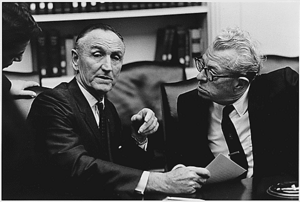
Senate Elections
In 1950, Dirksen ran for the U.S. Senate. He won against the person who was then the Senate Majority Leader, Scott W. Lucas. He was re-elected three more times in 1956, 1962, and 1968.
Senate Minority Leader
In 1959, Dirksen was elected Senate Minority Leader. This meant he was the top Republican in the Senate. He held this important position until he died. He helped unite different groups within the Republican Party.
Dirksen became a well-known national figure. He often appeared on TV news shows to discuss politics. He worked well with the Senate Majority Leader, Mike Mansfield, even though they were from different parties.
Views on the Vietnam War
Dirksen had changed his views on foreign policy over time. He became a strong supporter of President Dwight D. Eisenhower and President John F. Kennedy's international policies. He was a leading "hawk" on the Vietnam War. This meant he strongly supported the U.S. military involvement. He gave President Lyndon B. Johnson strong public support for his actions in Vietnam.
Civil Rights Legislation
Dirksen supported important civil rights laws. He voted for the Civil Rights Act of 1957, Civil Rights Act of 1960, Civil Rights Act of 1964, and Civil Rights Act of 1968. He also supported the 24th Amendment (which banned poll taxes) and the Voting Rights Act of 1965.
In 1964, Southern senators tried to stop the Civil Rights Act of 1964 from passing. They used a tactic called a filibuster, which meant they talked for a very long time to prevent a vote. Dirksen worked with other senators to create a compromise. After 57 days, the bill passed in the Senate.
Dirksen famously said during this time: "Stronger than all the armies is an idea whose time has come. The time has come for equality of opportunity in sharing of government, in education, and in employment. It must not be stayed or denied."
Dirksen also tried to pass a constitutional amendment to allow organized prayer in public schools. However, it did not get enough votes to pass. He also opposed the "one man, one vote" idea for state legislatures. He believed it would give too much power to large cities.
Public Persona and Legacy
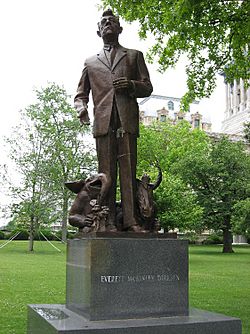
Dirksen was known for his unique speaking style. He recorded four spoken-word albums. In 1967, his poem "Gallant Men" became a hit song and won a Grammy Award. He also appeared on TV shows.
Dirksen was known for changing his mind on issues. He was also famous for trying to make the marigold the national flower. His hometown of Pekin, Illinois, now holds an annual "Marigold Festival" in his memory.
Many places are named after him:
- The Dirksen Senate Office Building in Washington, D.C.
- A federal courthouse in Chicago, the Everett McKinley Dirksen United States Courthouse.
- A parkway in Springfield, Illinois.
- An elementary school in Chicago.
Personal Life
Dirksen was married to Louella Carver. They had one daughter, Joy. He was a member of the Second Reformed Church and a Freemason.
Death
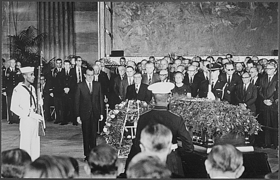
In August 1969, doctors found lung cancer. Dirksen had surgery in September 1969. He developed complications and died on September 7, 1969, at age 73.
His body lay in state at the United States Capitol rotunda. He was then buried in Glendale Memorial Gardens in Pekin, Illinois.
See also
 In Spanish: Everett Dirksen para niños
In Spanish: Everett Dirksen para niños
- List of members of the American Legion
- List of United States Congress members who died in office (1950–99)
Images for kids
 | Laphonza Butler |
 | Daisy Bates |
 | Elizabeth Piper Ensley |


